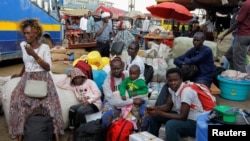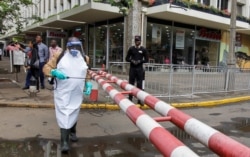The number of confirmed COVID-19 cases in Africa has surpassed 800, an eightfold increase from just one week ago. But a shortage of test kits in many African countries means the number of infected is likely far higher.
Dr. Ahmed Kalebi has been trying to acquire test kits for his laboratory in Nairobi.
Kalebi is a lead consultant pathologist at Lancet Group of Laboratories, a network of private diagnostic labs in Africa. A week ago, he found out for himself just how difficult it is to get tested for the coronavirus in Kenya.
After returning from Rwanda, he developed joint pain, fever and coughing.
The next day, Rwanda confirmed its first case of COVID-19.
“I decided not to go to the mosque. I decided not to go to work. I observed myself, and it was getting worse, so I called one of my colleagues at the office — one of my doctor friends — put on my mask and went to see them." Afterward, Kalebi said, he decided it was best to get tested.
Few tests available
Although the Kenya Medical Research Institute conducts tests at no cost to the patient, it hasn't been easy to get tested for coronavirus. Kalebi said this was because there were only a couple hundred test kits left in Kenya.
So he sent his sample to a laboratory in South Africa. Even there, Kalebi said, there was a backlog of 7,000 samples.
“Not many countries have commercial or large-scale production of these kits, and certainly in Africa we don’t have that,” he said.
Health experts are emphasizing the importance of testing at this point in the pandemic to better gauge the scale of infections.
Gyude Moore was a Liberian minister and senior adviser during the 2014 Ebola outbreak in West Africa. In a telephone press briefing Thursday by the Center for Global Development, he said social distancing measures would be effective only if paired with testing. Moore said that in African countries, where parts of the urban population live in crowded slums, testing is key.
“It’s important for us to be able to test them, first, to be able to get a good handle on the scale of the problem that we have, but second, so that we can be able to move to the second step, which is the isolation," Moore said. "So I’m worried about that. I’m worried about the testing capabilities.”
African countries have stepped up their testing capabilities with training from the Africa Centers for Disease Control and Prevention and test kits from China.
Kenyan Cabinet Secretary Mutahi Kagwe said in a news conference Thursday that the amount of testing kits in the country was now adequate.
"As far as the testing kits are concerned, we continue to buy as necessary," Kagwe said. "The philanthropist Jack Ma has sent us through CDC some 20,000 testing kits. But even locally, we have continued to purchase. We have not run out of testing kits so far.”
Random screenings set
Kenya’s Ministry of Health also plans to conduct random public screenings for coronavirus beginning Saturday. Anyone exhibiting symptoms will have samples taken for testing.
Speaking via a messaging application, University of Nairobi virologist Dr. Moses Masika said this more aggressive approach could help.
“This could in fact lead to the detection of more cases, assuming there is spread in the community," he said. "But it could also lead to a confirmation that there is no community transmission ongoing.”
Masika said a sharp increase in confirmed cases could cause fear, but not if it was messaged in the right way.





